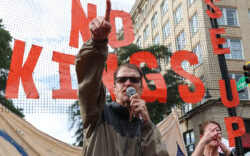“Onward, Christian soldiers, marching as to war” are the opening words of a hymn that has been sung in churches for more than a century. Today, some who call themselves Christians are taking calls to war onto the political battlefields of America.
Writing in The New York Times on July 7, author Katherine Stewart warned that the recent Supreme Court ruling overturning the Roe v. Wade decision that guaranteed abortion rights in America “is the beginning of a new and much more personal attack on individual rights.” The end of abortion in America had been a goal of what Stewart calls “Christian nationalists” for nearly 50 years. Now that they have won that long-sought goal, the Christian nationalists on the religious right are hungry for more.
“The shape of the Christian Nationalist movement in the post-Roe future is coming into view,” wrote Stewart, “and it should terrify anyone concerned for the future of constitutional democracy.” The religious right has long been a powerful force in American politics, and since the 2016 election, the movement has embraced Donald Trump as its own modern-day messiah. After the defeat of Roe, Stewart said, “movement leaders are already preparing for a new and more brutal phase of their assault on individual rights and democratic self-governance. Breaking American democracy isn’t an unintended side effect of Christian nationalism. It is the point of the project.”
After Roe was scuttled, conservative Supreme Court Justice Clarence Thomas hinted that other long-held political and social rights could also be on the chopping block. Access to contraceptives, the right to same-sex marriage, environmental protection and issues of church/state separation could all be toppled by the right-wing majority on the high court—to the delight of those in the Christian nationalist cabal. In her 2019 book The Power Worshippers: Inside the Dangerous Rise of Religious Nationalism, Stewart wrote that this country’s religious right-wing “is a political movement and its ultimate goal is power.”
Nearly a century ago, in his 1927 novel Elmer Gantry, author Sinclair Lewis used fiction to warn this nation of the pitiless power of right-wing Christian nationalists. “They were mild enough now,” he wrote. “They spoke in the name of virtue, but give them rope and there would be a new Inquisition, a new burning of witches.”
In 1935 Lewis published It Can’t Happen Here, his novel about this country under the thumb of a folksy fascist who brings an American dictatorship to the White House after he is elected by fearful and angry voters. Both those books are cautionary tales for concerned Americans today. In these times of Christian supremacists lusting for power while thuggish groups like the Proud Boys, the Oath Keepers and the rest of Trump’s coup cult clowns stormed the Capitol Building on Jan. 6, 2021, we as a nation would do well to heed warnings about the religious right written by authors like Lewis a century ago and Stewart today.
In an influential 1964 essay titled “The Paranoid Style in American Politics,” educator Richard Hofstadter wrote that “American politics has often been an arena for angry minds.” His words seem prescient but understated in this era of current politics when the Republican Party’s Trumpian base is in the thrall of “Qanonsense” conspiracy theories trumpeting an angry conservatism mixing rifles and religion, pistols and prayer, bullets and the Bible. In 1964 Hofstadter said that “heated exaggeration, suspiciousness and conspiratorial fantasy” were basic elements of the paranoid political mindset. That statement still holds true today.
The Jan. 6 hearings are just the latest warning to an America that is imperiled by domestic terrorism, white supremacy and oppression masquerading as religion. Those who would tear down the fragile wall of separation between religion and politics in their lust for power should heed the words that Union general and U.S. President Ulysses Grant spoke in 1875: “Leave the matter of religion to the family altar, the church and the private schools supported entirely by private contributions. Keep the church and the state forever separated.”
Like what you just read? Support Flagpole by making a donation today. Every dollar you give helps fund our ongoing mission to provide Athens with quality, independent journalism.










